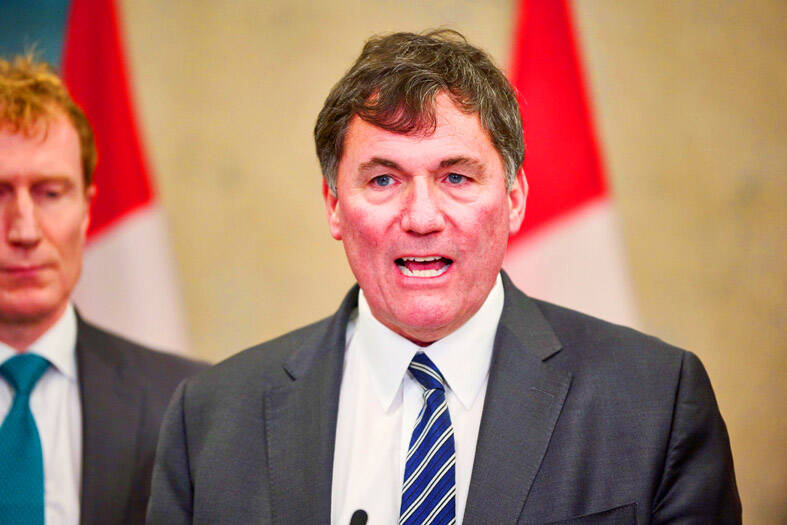Four Canadian ministers on Tuesday unveiled a border security plan they had privately presented to US president-elect Donald Trump’s incoming administration, with an emphasis on surveillance, intelligence and technology.
Canadian ministers had an “encouraging” meeting with Trump’s border czar, Tom Homan, Canadian Minister of Finance, Public Safety, Democratic Institutions and Intergovernmental Affairs Dominic LeBlanc told reporters.
“I went through with Mr Homan the information that we’re sharing with you today... I’m encouraged by that conversation and by conversations I’ve had with the incoming [US] secretary of commerce, Howard Lutnick,” LeBlanc said.

Photo: Bloomberg
LeBlanc and his colleagues announced a plan to beef up the US-Canada border with helicopters, drones, surveillance towers and sniffer dogs, as well as a “joint strike force” to target transnational organized crime.
The embattled minority government of Canadian Prime Minister Justin Trudeau said it would invest C$1.3 billion (US$908 million) toward border security over six years.
The plan focuses on fentanyl, irregular migration and organized crime.
Canada has been under pressure to beef up its border with the US since Trump threatened Canada and Mexico with sweeping 25 percent tariffs if they did not stem the movement of migrants and drugs into the US.
US authorities apprehended more than 23,000 people near the US-Canada border in the 12 months ending in October, more than double the previous 12-month period, but a tiny fraction of the 1.5 million people apprehended near the US-Mexico border during that time.
Canadian police said they have installed more cameras and sensors over the most-traversed section of the border over the past four years.
However, they acknowledge there is little they can do to stop southbound crossers.
Experts said the flurry of attention to the US-Canada border is as much about perception as reality.
A more effective mode of interdiction might be to stop people from coming to Canada in the first place, they said.
Canada is already attempting that — granting fewer visas and turning away visa-holders.
Canada also plans to amend its immigration law to allow authorities to “cancel, suspend, or vary immigration documents for reasons deemed in the public interest.”
Trudeau’s government was thrown into chaos on Monday when his finance minister and deputy prime minister Chrystia Freeland quit. Trudeau, trailing in polls, faces calls from within his own caucus to resign.

The CIA has a message for Chinese government officials worried about their place in Chinese President Xi Jinping’s (習近平) government: Come work with us. The agency released two Mandarin-language videos on social media on Thursday inviting disgruntled officials to contact the CIA. The recruitment videos posted on YouTube and X racked up more than 5 million views combined in their first day. The outreach comes as CIA Director John Ratcliffe has vowed to boost the agency’s use of intelligence from human sources and its focus on China, which has recently targeted US officials with its own espionage operations. The videos are “aimed at

STEADFAST FRIEND: The bills encourage increased Taiwan-US engagement and address China’s distortion of UN Resolution 2758 to isolate Taiwan internationally The Presidential Office yesterday thanked the US House of Representatives for unanimously passing two Taiwan-related bills highlighting its solid support for Taiwan’s democracy and global participation, and for deepening bilateral relations. One of the bills, the Taiwan Assurance Implementation Act, requires the US Department of State to periodically review its guidelines for engagement with Taiwan, and report to the US Congress on the guidelines and plans to lift self-imposed limitations on US-Taiwan engagement. The other bill is the Taiwan International Solidarity Act, which clarifies that UN Resolution 2758 does not address the issue of the representation of Taiwan or its people in

US Indo-Pacific Commander Admiral Samuel Paparo on Friday expressed concern over the rate at which China is diversifying its military exercises, the Financial Times (FT) reported on Saturday. “The rates of change on the depth and breadth of their exercises is the one non-linear effect that I’ve seen in the last year that wakes me up at night or keeps me up at night,” Paparo was quoted by FT as saying while attending the annual Sedona Forum at the McCain Institute in Arizona. Paparo also expressed concern over the speed with which China was expanding its military. While the US

SHIFT: Taiwan’s better-than-expected first-quarter GDP and signs of weakness in the US have driven global capital back to emerging markets, the central bank head said The central bank yesterday blamed market speculation for the steep rise in the local currency, and urged exporters and financial institutions to stay calm and stop panic sell-offs to avoid hurting their own profitability. The nation’s top monetary policymaker said that it would step in, if necessary, to maintain order and stability in the foreign exchange market. The remarks came as the NT dollar yesterday closed up NT$0.919 to NT$30.145 against the US dollar in Taipei trading, after rising as high as NT$29.59 in intraday trading. The local currency has surged 5.85 percent against the greenback over the past two sessions, central